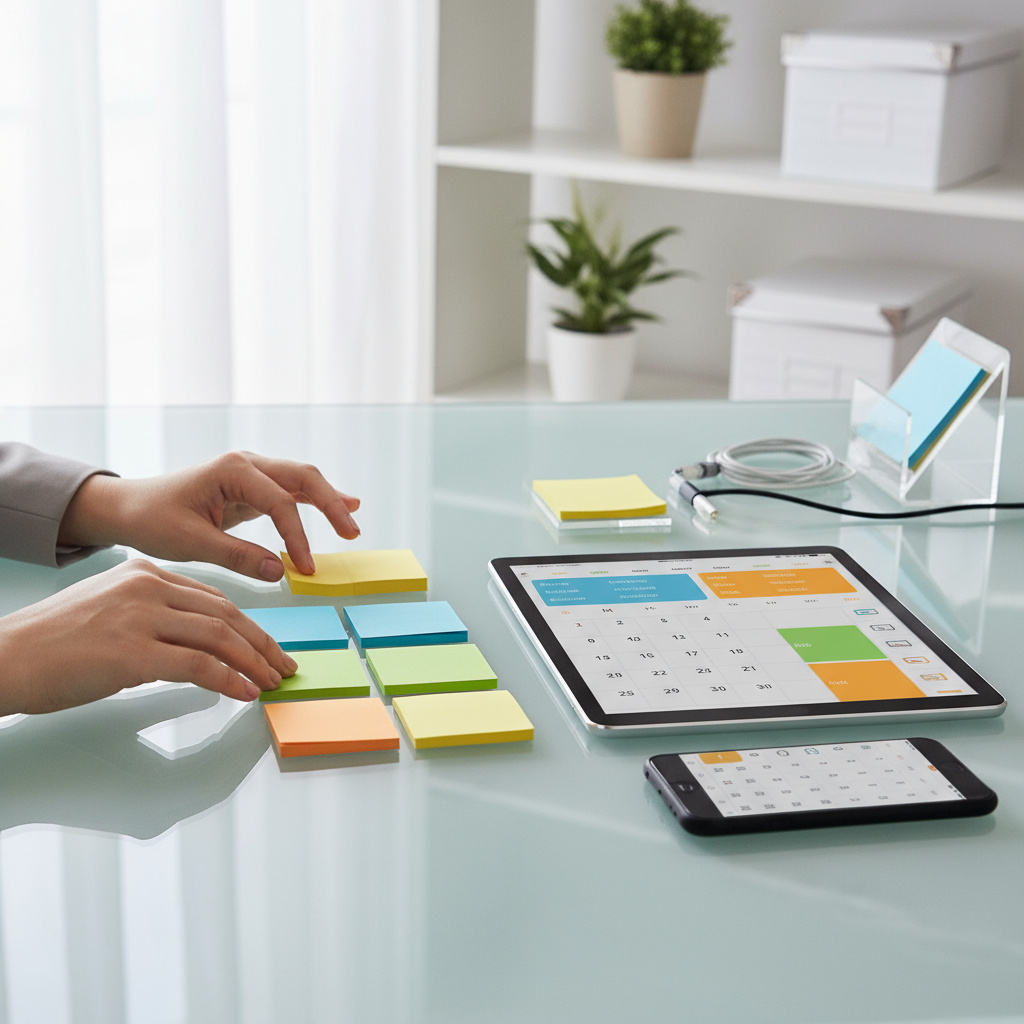
Table of Contents
Introduction
Picture this: you wake up tomorrow morning and actually know where your keys are. Your desk isn’t buried under a mountain of papers. Your phone isn’t buzzing with overdue reminders. Sounds pretty nice, right? That’s the power of staying organized—and it goes way deeper than just having a tidy space.
Here’s what I’ve learned: organization isn’t about being perfect or having everything color-coded (though if that’s your thing, go for it). It’s about creating systems that actually work for your life. When you’re organized, something magical happens—you stop feeling like you’re constantly playing catch-up. Instead of frantically searching for that important document or wondering what you forgot to do today, you’re in control.
But why does this matter so much? Well, science backs this up. When our surroundings are chaotic, our brains literally produce more cortisol—that’s your stress hormone working overtime. No wonder you feel frazzled when your workspace looks like a tornado hit it! The good news? Simple organization techniques like making effective to-do lists and keeping a clean workspace can actually calm your nervous system. If you want to dive deeper into the specifics, check out this guide on how to stay organized effectively—it’s packed with actionable strategies that actually work.
Now, let’s be real about something. Staying organized isn’t a one-and-done deal. (I wish it were that easy!) It’s about building habits that stick. Think of it like going to the gym—you don’t get fit from one workout, but consistent effort pays off big time. Daily routines like regular decluttering, smart task prioritization, and using the right management tools become second nature over time. Take your computer files, for example. When everything has a proper home with clear labels, finding that presentation from three months ago takes seconds instead of twenty frustrating minutes. And speaking of time, mastering the best time management skills works hand-in-hand with organization to help you make the most of every hour.
What really gets me excited about organization is how it ripples out into everything else. When your environment supports clarity instead of chaos, you’re not just more productive—you’re calmer, more focused, and frankly, a lot more pleasant to be around. (Ask my family—they’ll confirm this!) Your work performance improves. You have more quality time for the people you care about. You sleep better knowing tomorrow’s agenda is already mapped out. For those looking to supercharge these benefits, exploring effective stress reduction methods can take your organizational success to the next level.
What You’ll Learn in This Guide
This guide is designed to give you practical, real-world strategies for staying organized in every area of your life. Whether you’re drowning in paperwork, struggling with time management, or just want to find the right tools and apps, we’ve got you covered. Here’s what’s coming up:
- Understanding the Importance of Organization: We’ll explore why organization truly matters, connecting it to better productivity, less stress, and improved overall well-being. You’ll understand exactly why making organization a priority is one of the best investments you can make.
- Effective Daily Habits to Adopt: Discover specific, actionable habits like creating meaningful to-do lists, establishing regular decluttering routines, and smart priority-setting that will weave organization seamlessly into your everyday life.
- Mastering Time Management Techniques: Learn practical methods for using planners, calendars, time-blocking, and task breakdown strategies to maximize your available time and keep yourself consistently on track.
- Choosing the Best Tools and Apps: We’ll review popular task management and note-taking apps like Todoist, Trello, Evernote, and Google Drive, showing you exactly how to leverage technology to stay organized without getting overwhelmed.
But wait—there’s more. (I know, I know, that sounds like an infomercial, but stick with me.) We’ll also tackle those pesky challenges that trip up even the most well-intentioned organizers. Procrastination, distractions, shiny object syndrome—we’re addressing all of it with practical solutions that actually work in real life. Plus, you’ll learn how to maintain your organizational systems long-term, because let’s face it, starting is only half the battle.
While you’re diving into this content, you might also want to explore some related skills, particularly time management techniques. These strategies work beautifully together to create a complete system for enhancing your daily routines and boosting overall productivity.
Ready to transform how you manage your space and time? The organized, stress-free lifestyle you’ve been dreaming about isn’t just possible—it’s completely within your reach. Let’s get started on building systems that will make your future self thank you.

Here’s the thing about staying organized—it’s not just about having a Pinterest-perfect home or desk. (Though that would be nice, right?) The real magic happens when you realize how much mental space you get back. We’re going to dig into both why organization matters so much and, more importantly, how to actually make it stick in real life. Because let’s be honest, most of us have tried the whole “get organized” thing before, only to find ourselves back in chaos mode within a week. Organization touches everything—your headspace, how you handle stress, even how much you can actually get done in a day. Once you understand these connections, you’ll see why the practical tips and tools we’ll cover aren’t just nice-to-haves. They’re game-changers for both your physical spaces and that digital mess we all pretend doesn’t exist.
The Benefits of Staying Organized
Let’s talk about what staying organized actually does for you. And no, it’s not just about impressing your friends with your color-coded closet. When you’re organized, something shifts in your brain. You feel more in control, less scattered, and way more capable of handling whatever life throws at you. Think about the last time you walked into a really messy room versus a clean, organized space—notice how different you felt? That’s your brain responding to visual chaos versus calm. This section breaks down exactly how organization streamlines your daily routine, sharpens your focus, and helps you manage time like a pro. These benefits work together to reduce that overwhelming feeling we all know too well and replace it with something much better: confidence in tackling your to-do list. Want to take this further? Check out how to boost productivity in the workplace for workplace-specific strategies. And if stress is your main concern, learning about effective ways to reduce stress pairs perfectly with an organized approach to life.
Here’s where it gets interesting—organization is basically a superpower for time management. When you know where everything is and have a clear plan, you stop wasting time on the little stuff. No more hunting for your keys for ten minutes. No more scrolling through emails trying to find that important message. You can actually focus on what matters. With solid priorities and a structure that works, distractions lose their power over you. Your focus gets sharper, your efficiency improves, and suddenly you’re getting more done in less time than you thought possible. It’s like upgrading your brain’s operating system. If you want to dive deeper into this, how to manage time effectively has strategies that work hand-in-hand with what we’re covering here.
Key Advantages
Organization impacts several key areas that genuinely improve how you feel and perform every day:
- Reduced Stress and Anxiety: When your surroundings and schedule have some order to them, you eliminate a lot of those “surprise” stressful moments. You know—like realizing you forgot about that important meeting or can’t find the document you need right now. Building structured habits (even simple ones) creates this sense of calm that helps you handle daily pressures without feeling like you’re constantly putting out fires.
- Increased Efficiency and Productivity: This one’s huge. No more wasting precious time digging through piles of stuff or trying to remember where you saved that file. When you prioritize tasks and set clear goals, you naturally focus on what actually matters instead of getting caught up in busy work. The result? You get more meaningful stuff done.
- Better Time Management and Focus: Organization gives you the power to plan with intention instead of just reacting to whatever comes up. You can allocate your time wisely, stay focused on your priorities, and find that sweet spot between work and everything else. Say goodbye to procrastination and hello to actually concentrating on what you’re doing.
- Improved Well-being and Mental Clarity: A clutter-free space (both physical and mental) creates room for clear thinking and emotional balance. When you regularly organize your environment, you’re also building habits that support your overall wellness, creativity, and personal growth. It’s like giving your mind permission to breathe.
With these benefits in your corner, you’re ready to dive into the strategies that actually make organization sustainable. Because knowing why it matters is great, but knowing how to do it? That’s where the real transformation happens.
Practical Strategies to Stay Organized
Okay, let’s get into the good stuff—the actual strategies that work in real life, not just in theory. Organization isn’t about perfection; it’s about creating systems that work for you and your lifestyle. We’re covering both your physical spaces (yes, that junk drawer counts) and your digital life (looking at you, desktop with 847 random files). These techniques work together to create an organized lifestyle that actually supports your productivity and well-being instead of feeling like another chore on your endless list. And speaking of productivity, top productivity tools for effective time management can seriously upgrade your organization game.
Here’s what’s equally important—using tools and technology that actually make your life easier, not more complicated. Digital calendars, task management apps, file organization systems—these aren’t just for the super tech-savvy. They’re for anyone who wants to streamline their workflow and keep important stuff where they can actually find it. When you use these tools effectively, staying on track with deadlines, commitments, and priorities becomes so much more manageable. Pro tip: If you’re looking to organize your fitness routine too, check out best workout routines at home to build healthy habits alongside your newfound organization skills.
Daily Habits for Organization
Here’s the truth—daily habits are what make or break your organizational efforts. Without consistent routines, you’ll always be playing catch-up with chaos. The good news? These habits don’t have to be complicated or time-consuming. Start with these essentials:
- Make To-Do Lists: Write it down. Seriously, just write it down. When you can see your tasks on paper (or screen), they become manageable instead of this swirling mess in your head. Prioritize based on what’s urgent and what’s important—there’s a difference, and figuring that out will save your sanity.
- Declutter Regularly: Set a timer for 10 minutes and tackle one small area. Maybe it’s your desk, maybe it’s that one kitchen counter that somehow becomes a black hole for random stuff. A clutter-free environment isn’t just prettier—it actually helps your brain focus and makes finding things way easier.
- Set Priorities: Every day, pick your top 3 most important tasks. That’s it—just three. When you’re clear about what really matters, you stop spinning your wheels on busy work and start making real progress on what counts.
- Review and Reflect: Before you call it a day, take five minutes to look at what you accomplished and what’s still on your plate. This isn’t about judging yourself—it’s about adjusting your plans realistically and setting yourself up for success tomorrow.
These habits create a foundation for staying proactive instead of reactive. Find systems that fit how you actually live, not how you think you should live, and these habits will become second nature.
Time Management Techniques
Time management and organization go together like coffee and Monday morning—you really can’t have one without the other. Try these techniques to make the most of your hours:
- Use Planners or Calendars: Digital, paper, whatever works for you—just pick one and stick with it. The key is making your schedule visible and setting up reminders so important stuff doesn’t slip through the cracks. Consistency here creates accountability.
- Apply Time-Blocking: This is a game-changer. Instead of bouncing between tasks all day, block out specific time slots for focused work. When you’re not constantly switching gears, you’ll be amazed at how much better quality work you can produce.
- Break Tasks into Smaller Steps: That overwhelming project sitting on your list? Break it down into bite-sized actions. Smaller steps build momentum and make progress feel achievable instead of impossible. Your brain loves checking things off, so give it more opportunities to celebrate.
- Limit Distractions: Create a workspace (even if it’s just a corner of your kitchen table) and silence those notifications during focused work time. Distractions are productivity killers, but they’re also totally manageable once you’re intentional about limiting them.
When you combine these time management strategies with your daily organizational habits, meeting deadlines becomes less stressful and maintaining work-life balance becomes actually possible. Ready for the next piece of the puzzle?
Organizing Physical and Digital Spaces
Your environment shapes how you think and work, so let’s make sure it’s working for you, not against you. Here’s how to tackle both your physical and digital spaces:
- Keep Workspaces Tidy: This doesn’t mean magazine-perfect, but it does mean functional. Give frequently used items a designated home so you’re not constantly searching. A quick daily reset makes a huge difference in how you feel when you sit down to work.
- Organize Files and Emails with Folders and Labels: Create a system that makes sense to you—not what some productivity guru says is “right.” Good naming conventions and categories save you tons of time and frustration when you’re trying to find something important.
- Implement Storage Solutions: Invest in containers, shelves, and organizers that actually fit your space and needs. Think about how you naturally move through your space and create functional zones for different activities. Work with your habits, not against them.
- Regular Backup and Cleanup: Schedule time (monthly works great) to back up important digital files and delete the ones you don’t need anymore. This keeps your digital life running smoothly and protects you from that heart-stopping moment when something important disappears.

Here’s the thing about staying organized—it changes everything. Not just your space (though that’s nice too), but your entire mindset. When you get organization right, you’re not just tidying up; you’re unlocking serious productivity gains, cutting stress, and creating the mental clarity that makes everything else easier. We’ve covered a lot of ground together: actionable to-do lists that actually work, decluttering that doesn’t feel overwhelming, and priority-setting that keeps you focused on what matters. Think of these as your foundation—the habits that turn chaos into calm and help you feel like you’re actually in control of your day.
Time management techniques? They’re your secret weapons. Planners, time-blocking, breaking big scary tasks into bite-sized pieces—these aren’t just productivity tricks. They’re sanity savers. And let’s talk about your spaces, both physical and digital. When everything has a home and you can actually find what you need, you free up mental energy you didn’t even realize you were wasting. Those apps we discussed—Todoist, Trello, Evernote, Google Drive—they’re not magic bullets, but they’re pretty close when used right. The real magic happens when you stick with it. Building review routines, celebrating those small wins (yes, even organizing your junk drawer counts!), and tweaking your systems as life changes—that’s how you make organization stick. Because let’s be honest, we all know someone who organized their entire life… for about two weeks. Don’t be that person. When procrastination hits or you feel overwhelmed, you’ll have strategies ready to keep moving forward.
The truth is, organization isn’t about having Instagram-perfect spaces or color-coded everything. It’s about creating a system that actually works for your real life—messy, unpredictable, and beautifully human as it is. When you embrace that mindset and put these habits into practice, you’re setting yourself up for something bigger: a life where you can focus on the stuff that really matters instead of constantly hunting for your keys.
Ready to dive deeper? Your organizational journey doesn’t stop here. Master your time with our guide on time management skills—because good organization and smart time management go hand in hand. Since staying organized can feel stressful sometimes (ironic, right?), check out our proven stress reduction methods. Want to track your progress and thoughts? Our beginner’s guide to journaling will get you started. And because a clear mind needs a healthy body, explore our best workout routines at home—no gym required. For that extra mental clarity boost, discover how mindfulness meditation can sharpen your focus and keep you centered.
Look, getting organized gives you something invaluable: control over your own life. Each small step builds momentum. Start where you are, with what you have, doing what feels doable today. Stay flexible, be patient with yourself, and watch how these changes ripple through everything you do. You’re not just creating a tidier space—you’re building a better, more balanced version of yourself. And that person? They’re ready for whatever comes next.
Frequently Asked Questions
-
How long does it take to become organized?
- The time varies, but consistent habits over a few weeks can make a significant difference. Patience and persistence are key to building sustainable organization.
-
What are the best tools for personal organization?
- Popular options include task management apps like Todoist and Trello, as well as note-taking apps such as Evernote and Google Drive, which help streamline your daily routines.
-
How do I stay organized at work and home?
- Create separate systems tailored to each environment and commit to daily habits like to-do lists and regular decluttering to maintain order consistently.
-
What if I get overwhelmed by organizing?
- Break tasks into small steps and take breaks to avoid burnout. Focus on progress over perfection and adjust your systems as needed to reduce stress.
-
Can staying organized improve mental health?
- Yes, reducing clutter and managing tasks can lower stress, improve focus, and enhance overall mental well-being with consistent practice.
